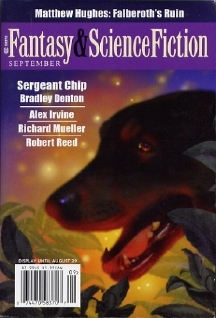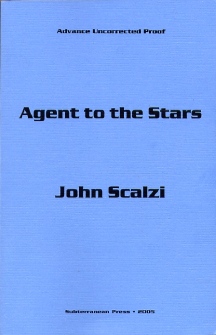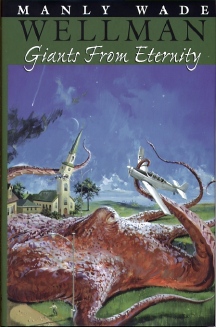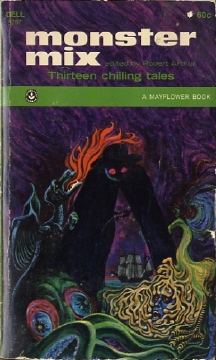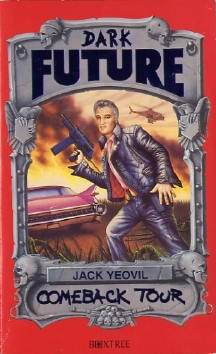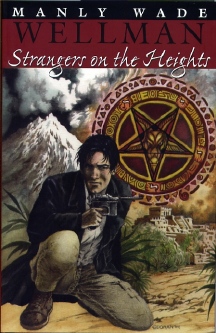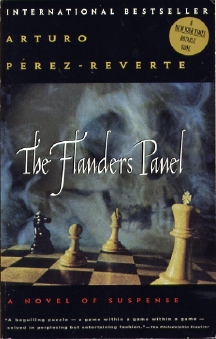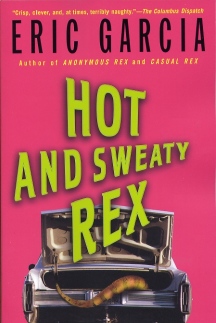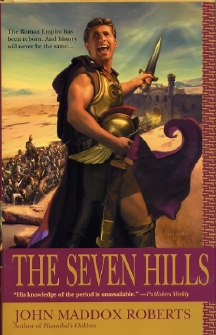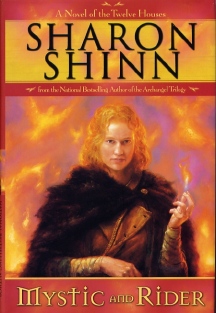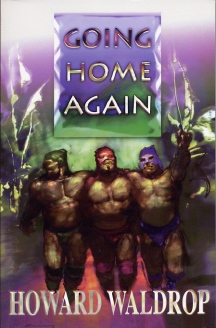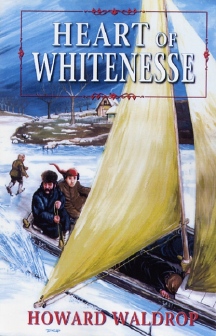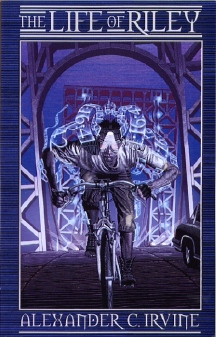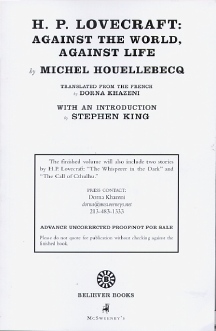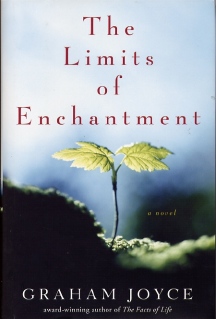|
|
|
This Just In...News from the Agony Column
|
02-24-05: John Scalzi's 'Agent to the Stars' |
|||
From
Trunk to Treasure
Because most "first novels" you encounter are in fact the first "published" novel by a writer. Contrary to what you might think or want to think, the first novel published by a writer is not often the first novel written by a writer. Now, you'll read all sorts of glamorous accounts of lonely souls slaving away for the first time at their word processors or their notebooks. But these are the exceptions, not the rules. Readers rarely see a writer's first novel. Usually we see number three, or four, or seventeen. Once published, those early novels may emerge should they cross the thresholds of quality and audience demand. But until they do, they remain tucked away, and are generally known as "trunk novels". On the Internet -- where everyone can hear you whisper and then quote that whisper out of context -- first novels can find a different fate. Writers with enough guts, goodwill and generous warnings have been known to self publish unpublished first novels. Charles Stross offers 'Scratch Monkey', one of several trunk novels, from his website under a Creative Commons license. And John Scalzi offers 'Agent to the Stars', his first novel, from his website as well. But soon enough -- on July 25, 2005 -- readers (like myself) who prefer to read their novels on little pieces of paper will be able to get a copy of 'Agent to the Stars' from Subterranean Press at the bargain price of $30.00. In Scalzi's introduction to the novel, he tells of writing it as a lark, attempting to get it published, and his decision to put it up on the web. He hoped that readers would send him a buck or two, and they certainly did that; between 1999 and 2004, he made $4,000. Still, he was happy with it where it was and as it was. But once 'Old Man's War' came out to some acclaim, the people who had read 'Agent to the Stars' asked Scalzi if he'd ever get his first novel published in book form. Of course, having already given it away, he had no expectations of doing so. But that's why the Small Press Rules OK. There's a niche to be filled and in this case Subterranean Press fills it nicely. I just received an email from Scalzi, and apparently, they're not going with the blue cover. Instead, he tells me, "One of the very cool things about the upcoming book is that it's going to feature a cover by Mike "Gabriel" Krahulik of Penny Arcade; I'm pretty sure it'll be his first book cover (outside of some comic books and the Penny Arcade stuff). I'm very excited about Gabe's involvement; it's going to help make the book a truly excellent collector's item." 'Agent to the Stars' begins as the star-faring Yherajk people arrive on Earth to meet us and begin our first friendship with an alien race. There's only one hitch: they're horrific monsters and they smell bad. What they need is a good PR guy -- and they find him in Thomas Stein. To my mind, this "gleeful mash-up of science fiction and Hollywood satire" looks precisely like the kind of humorous novel I greatly enjoy reading on a nice summer day on the back porch. Given the publication date, it looks like I will get my wish. I get a sort of 'First Contract' vibe from this novel, and 'First Contract' was a novel I really enjoyed. In a world of deadly serious SF, it's nice to find light-hearted fare. And it's even better to find it printed on little pieces of paper, sewn together by people who love books. Yes, if youre impatient and have either lots of paper or lots of patience you can read the novel online...but I'm already anticipating holding the book in my hands. The real question is not whether or not to buy the book -- of course you'll buy the book. The real question is: is it his first novel or his second? |
|
02-23-05: Night Shade's Manly Wade Wellman Series: 'Giants from Eternity' and 'Strangers on the Heights'; Arturo Perez Reverte 'The Flanders Panel' |
||||||||||
The
Library in Your House
Book lust is a funny thing, isn't it? You wouldnt think that the beauty of books could trump the intellectual appeal of books, would you? After all, it's whats inside that counts. And with the Manly Wade Wellman series, Night Shade is bringing back into print the best stories by a master of science fiction, horror and fantasy. These stories are iconic for a reason; they're the giants' shoulders that many of today's writers are standing upon. I first encountered Manly Wade Wellman where I first encountered many of the writers I still read and enjoy today -- in Robert Arthur's Dell Mayflower Book, 'Monster Mix'. This anthology designed to corrupt the tender minds of youth was a smashing success in my case. It starts with Guy Endore's 'Day of the Dragon', which should have been credited as the source for the recent movie disaster (as opposed to a disaster movie) 'Reign of Fire', though given the quality of the end product, the filmmakers did Endore a favor. It includes 'Mimic', filmed much more successfully by Guillermo Del Toro. It includes Robert Bloch's 'The Mannikin' and Algernon Blackwood's 'The Wendigo', two tales that haunt me to this very day.
I do believe that I have a Dark Harvest volume or two somewhere in the stacks, but I'm too lazy^H^H^Hate today to find them. I can see from where I sit my copy of 'The School of Darkness', a John Thunstone novel. But that was about it. Until now. Until the Night Shade books of 'Giants From Eternity' and 'Strangers on the Heights' arrived. These are the finished copies, shipping now, for a mere $25 a pop. I discussed 'Giants from Eternity' last year when I saw a proof, but I have to say that it didn't prepare me for how nice the hardcover copies would be. From the looks of them, the feel of them, I'd be prepared to drop a lot more, and I'd expect to. But Night Shade wants to and can go up against the major publishers, who are busy shooting themselves in the foot by splitting single novels into two books. Each of these books includes a short novel and a novella. In 'Giants from Eternity', you'll find the title novel and the novella 'The Timeless Tomorrow. In ''Strangers on the Heights', you'll find the title novel and the novella 'Nuisance Value'.
'Strangers on the Heights' sports an Elvis-with-machine-pistol cover that reminds me quite a bit of a cover for a Kim Newman novel, 'Comeback Tour', written under his pen name of Jack Yeovil. And the subject sounds entertainingly similar: "Will Gardestang and Aides use Commando Tactics When Attacked by Dread Demons and Devil Worshippers in the Unknown Realms of Psychic Adventure That Lie beyond the Borders of Reality!" Do you really need any more prompting to get this? This is MONSTERS GUARANTEED. This is artificial arms, and none of the post-millennial cyborg stuff, but good old fashioned Others. For those who crave the goodness of True Pulp Fiction, you need look no further. My advice to readers is to simply budget to buy these because chances are you'll see them in some store or another and then you'll have to yank out the credit card or something. They're cunningly designed to psychologically appeal to the total must-have-it obsessive librarian in my readers. Damn, there are times I wish I were a librarian, for a county library that is, because I could exercise my judgment and proudly display these books. This is what libraries are all about. Especially, alas, the libraries in your house. |
||||||||||
Literary Checkmate
Julia, a young art expert, specializes in restoring paintings, and her latest task is to work on a fifteenth century masterpiece that depicts a chess game between the Duke of Ostenburg and his knight as a lady in black velvet sits in the background. Julia's task exposes a hidden inscription in the corner of the painting: Quis necavit equitem. Who killed the knight? Of course, the answer to the question will put Julia's life in danger and greatly expand the reader's knowledge of chess strategies, art history, the world of selling historic art, and ancient libraries. And the novel puts the reader in peril of losing more sleep. Perez-Reverte wrote this novel back in 1990, and the first translation appeared from Harcourt Brace in 1994. My suggestion is that readers keep an eye peeled for the work of this author. When someone asks you if you've read That Book -- and trust me, they will -- you can wave This Book at them. A quick change-up is always the best way to ward off evil. Think of Perez-Reverte as the literary equivalent of a cross, garlic and Holy Water. Or better yet, get someone else to think of him as an author worth reading. |
||||||||||
|
02-22-05: Sharon Shinn, Eric Garcia, John Maddox Roberts |
|||||||||
SF
Roundup Part Three, The Hits Just Keep on Coming
Eric Garcia seems in no danger of disappearing. Having endured the deadly SciFi Channel adaptation of the first two parts of his saga, I believe, sort of mix-mastered into one piece, his latest novel is now out in a hot pink trade paperback. But 'Hot and Sweaty Rex' (Ace / Berkley / Penguin Putnam ; March 1, 2005 ; $13.95) is not, happily hot and sweaty in that way. If PI Vincent Rubio is hot and sweaty, it's because he finds himself wedged between a very sharp rock and a very hard place. Having recovered from, or at least acknowledged his addiction to basil, Rubio is deep in debt. That makes him ripe for the picking and he gets picked by dino-mob boss Frank Tallarico, then sent to Miami. There he finds his intended target is another dino-mob boss, who happens to be a childhood friend. This can only end in tears. But with Garcia manning the word-processor, the tears are more likely to be tears of laughter. It's my take that while the Rex series does not offer the breadth and depths of modern literature, it does offer its fans a rock-solid fix on continual faux-hardboiled humor, with a nice speculative twist. Of course, the whole dinosaurs-in-suits doesn't really admit to lots of speculation. You swallow these laughing pills whole. If you dont choke, then you've got yourself an auto-buy series. You might imagine a scaly version of Simon R. Green's Night Side series to get the right vibe going here. The fact of the matter is that if this is your cuppa, then you know it and you want it and the whole basil sub-plot is a reasonable interpretation of the reader's interest in the books. It's simple, silly and hard to shake. Unless you have a tail. That is a tail you've got hiddenm there, isn't it?
What readers will get is a gut-full of swords, no sorcery, and pages of scheming politicians who are pulling strings to try and send the pendulum of wealth and power into their corner. What I dont get is the necessity to muck with history to achieve this result. There are lots of periods of history that offer the writer an opportunity to write about the real struggles behind reality. Evidently, Roberts has covered those to the extent that he feels the need to revise history slightly with the result of offering himself more room to tweak and tease events into a pleasing form. But his changes are predicated on readers being highly informed about ancient history. In days when the man on the street considers the 1960's ancient history and World War Two pre-history, one wonders whether the changes are strictly necessary. Sometimes "Once Upon a Time" is back-story enough, so long as the forward story is propulsive enough. But Roberts does know his history; there's no doubting that. And he brings high level of gritty authenticity to his beloved battles, even if his authenticity is in the service of a history that never came to pass. Long ago, S. M. Stirling wrote that he'd decided to tackle alternate history because real history and reality had run his type of adventure story out of town. This appears to be a popular chain of reasoning, and its leading to a chain of popular alternate histories. I'm guessing that a fair proportion of Roberts' readers don't give a hoot about the alternate history aspects of this series. In a sense that's really good. Alternate history too often uses the old "In this reality, JFK is a realtor!" to get a bit of juice in the story. In 'The Seven Hills', many readers may not even know that the title itself is a reference to the seven hills of old Rome. And they may not care or care to care, so long as Roberts delivers the basics of good fiction; strong characters, a strong conflict and the perfect ratio of scheming politicians to sword-swing soldiers. Of course the lessons in these books are as eternal as the Eternal City itself. You can manipulate a people, an army only so much and only so long. Eventually the swords will start swinging in your direction, the guns will take aim at you, and the armies will show up at your door. Scheme while you can, monkey boys. Sooner rather than later, perfectly coiffed warriors will happily behead you. And though the blood may fall in an alternate timeline, the lessons will hit home in this one.
With 'Mystic and Rider' we have the old kingdom in peril routine going again. The kingdom in question is Gillengaria, a blob-like island that bears no semblance to any part of our globe. So, woven from whole cloth, we have Gillengaria, led by King Baryn and the barons of the Twelve Houses. This is a world where magic works, but doesn't necessarily win you any friends. In fact, though Baryn has married a woman who has the touch, the Barons are happily fomenting distrust of those who can do magic to advance their own agenda. Baryn dispatches a matched group of opposites to tour Gillengaria and get a read on how the people feel about all this. The mystic Senneth leads the group, balanced by the Rider Justin, who distrusts magic. Kirra a healer and shape-changer, born of the Twelve Houses, accompanies them, with her servant Donnal, lowborn shape-shifter, as does Tayse, another Rider who distrusts the magical in general and Senneth in particular. As this, lets call them "diverse" group gets into the deep south, they find a charismatic cult that wants to cleanse the world of the magical. And the little group that could becomes the little group that has to stop them, because nobody else is around to do so. Adversaries become allies in the face of true extremists. That's how you know this is fantasy, as in the real world, allies quibble while extremists slash and burn. With 440 full hardcover pages, you're going to find a full and complex world that speaks to issues in ours without getting in your face about it. Donata Giancola provides a very nice cover illustration of a gal who needs no Bic lighter. Perhaps she's hoping to light a fire under the reader. You'll need to burn some midnight oil if you're going to keep up with this blazing pace. |
|
02-21-05: SF Roundup Part Two |
||||||||||||||||||||
The Small Press
Well, didn't the kids say they didn't like school? Of course they did! So when we get a chance to enter Howard Waldrop's 'Heart of Whitenesse' (Subterranean Press ; April 25, 2005 ; $40.00), well, heck, forty bucks ain't nothin'. I can personally attest that it will only buy part of the average textbook. You can afford this puppy just by skipping lunch for a week, and then you can enjoy that week of skipped lunches by eating an apple a day, slimming down while you enjoy the work of one of genre fiction's most cherish assets. When we went to Torcon, who was The Man who helped roast and salute heavy-hitting fantasy superstar George R. R. Martin? Howard Waldrop, that's who, and he damn near stole the show with his hilarious and pithy storytelling. And telling -- man he told all. As much as I love his writing, I'd advise against making any sordid confessions to him. Unless, of course, you want to see them turned upside-down, shaken, stirred, mix-mastered and turned into one of Waldrop's unique pieces of fiction. Waldrop is one of those great enigmas in the -- I was going to say the speculative fiction publishing world, but hell, to my mind he's an enigma in the publishing world in general. Here's a man with a completely unfettered imagination and a fantastic sense of humor. He should he running circles around folks like PJ O'Rourke and the other humorists of the mainstream publishing world. He tucks more talent into his underwear than most of these guys can get out in their best boutonnièred tuxedos. Yet here he is in Subterranean Press, and while we have to be thankful that we get the care that goes into Subterranean Press books, it still seems a shame that he isn't plunked right on the bestseller lists every time he puts out another wonderful collection. Admittedly, if he were, I'd still want the Sub press edition, but still...here's a guy who deserves to be heard.
For me, Waldrop is perfect beer drinking fiction. He offers a combination of humor and straight-up wonder that's mellow and yet perfectly mind-boggling. Now, I say "straight-up wonder" and "mind-boggling" and as readers you might have some ideas as to what I mean about that, so I want to annihilate your pre-conceived notions about the above as they refer to Waldrop, because -- you need to. When we talk "wonder" or "sensawunda" in the science fiction world, what's usually conjured up is something like the first time you see the monolith on the moon in the movie '2001', when you first read the final line of 'The Nine Billion Names of God', when you first step out of 'The Time machine', when you first step into the spaceship in 'Have Spacesuit Will Travel', when you first see a sandworm rise above the surface in the book 'Dune', and begin to grok the ecological setup. "Sense of Wonder", thusly, is usually thought of as something grand, a huge vista unfurled before the reader's mind. Howard Waldrop elicits the precise same emotion that these greats do. But he does so with an imagination that is grandly odd. His most famous story 'The Ugly Chickens' is the perfect example of this. You get the full-bang, jaw dropping sense that anything, anydamnthing is possible -- while staring at photograph of an old, filthy family farmyard. This is the precise opposite of the grand scale usually associated with sensawunda, but the emotion is precisely the same. So that's why I would call his sensawunda "straight up" wonder. If the usual evocation involves a fairly complicated and large mixed drink, Waldrop offers straight whiskey that goes straight to the brain. And of course, a few laughs. Not taking himself overly seriously really helps Waldrop's fiction. But research that could probably warrant it's own academic publication helps as well. And like many readers, I look forward as much to Waldrop's afterwards about writing the stories nearly as much as the stories themselves. As for the stories, here, in his new collection, three of them hail from SciFi.com, where Ellen Datlow fights the good fight for great fiction. Both she and the stories she publishes get nominated for awards like nobody's business as a result. And you get material from 'New Worlds', edited David Garnett's ('Bikini Planet') and the 50th anniversary of F&SF. Ten stories, 274 pages, and very probably it will be in the twenty-teens before his next one comes out. Of course, in my science fiction story, the back of that book is filled with attributions for publication in The New Yorker, Atlantic Monthly, Harper's, Story. Which says as much about my SF as it does about Waldrop's.
Now, I'll allow that I've been a tad underwhelmed with the recent F&SF stories. That's only because I have some very high expectations based on 'A Scattering of Jades'. That said, this novella-length work looks to be utterly different, and all's the better. Dedicated to "apocalyptic kooks everywhere" (my wife might put me in that category every morning as I read the newspaper and begin to declaim on the -- dont start me), 'The Life of Riley' is a pixilated science fiction novel set in the mid-21st century. Here's what we start with: America as you might expect it, fractured along religious lines, and generally continuing down our current path of hell-in-a-handbucket. Add to that alien Bettys. Your guess is as good as mine, but I don't think they're BEMs. (Alas -- sigh!) Gabriel Riley flees his fundamentalist upbringing, enters the military and ends up protecting a tent city of refugees on the White House Lawn. From there into an underground network resisting the Bettys, and further, deeper, into a destiny that both his mother and the Bettys believe must come to pass. I dunno about you, but that's exactly the kind of thing I want to read about. Hell, that's why I read the paper every day.
Just to give you an idea of how damn connected everything is, last weekend I went and bought a copy of 'The Believer'. Five days later, I've got a 'H. P. Lovecraft: Against the World, Against Life' (Believer Books / McSweeney's ; April, 2005 ; No Price Yet) by Michel Houellebecq from McSweeney's brand new imprint Believer books. Here's not only a delectectable selection in itself, but a selection that launches what I believe to be the first imprint under the McSweeney's flag. The first release from Believer books was 'The Polysyllabic Spree' by Nick Horby,and other titles will include 'The Beliver Book of Writers Interviewing Writers', 'Heroes in Disguise' by Jim Shepard and 'Travésia del Horizonte' by Javier Marías.
That said, what more could you ask for when McSweeney's fires off a new Imprint -- this Believer book is officially an imprint of McSweeney's -- than a long, literate love-letter to H. P. Lovecraft from a dark and twisted, highly literate and well-regarded French writer? I just dont know if it gets any better than this. Well, Stephen King introduces it, and that's certainly something. It will Sell A Few Books. King's introduction is no two-paragraph dealie, but one of his full-blown occasional and highly enjoyable rants. The book itself -- a slim 115 pages at this point, though this is an early proof so it's subject to change without notice -- is divided into three parts; 'Another Universe', 'Technical Assault' and 'Holocaust'. For those of us who have read and continue to read and re-read Lovecraft, this promises to offer a new perspective on one of our most famous and favorite writers. Still the object of controversy -- Laura Miller over at Salon.com just penned an article unsurprisingly calling him "American's greatest bad writer" to commemorate the publication of American Library's 'Lovecraft: Tales' which just showed up down at Bookshop Santa Cruz -- Lovecraft himself always gets sales, always turns heads and always offers something to the reader. Unless said reader has shut that door and just won't open it again.
And finally, lest we forget, I'm here to remind you that you can now get one of the ten best books I read last year, alas, this year. Graham Joyce's 'The Limits of Enchantment' is one of those books that combines reading satisfaction on every level you could possibly seek reading satisfaction. That is, it's a gorgeously written evocation of the UK countryside in the 1960's; it's a supremely powerful tale of a young girl coming into womanhood; it's a superb tale of the surreal and the supernatural; it's a page-turning thriller about a community headed towards a confrontation between past, present and future; and it's a generously and genuinely funny story of quirky people doing odd things. Few writers have the power and the skill of Graham Joyce. Here's a link to the MP3 and the RealAudio version of the interview I did with Graham last year. His books have regularly been on my ten best, every damn year. Miss this book at your own peril. And back to work you! You already had one holiday, didn't you? You mean you dont celebrate President's day in the UK? Why on earth not? Oh -- well. It's just about time for me to read the headlines. And start shouting. |
